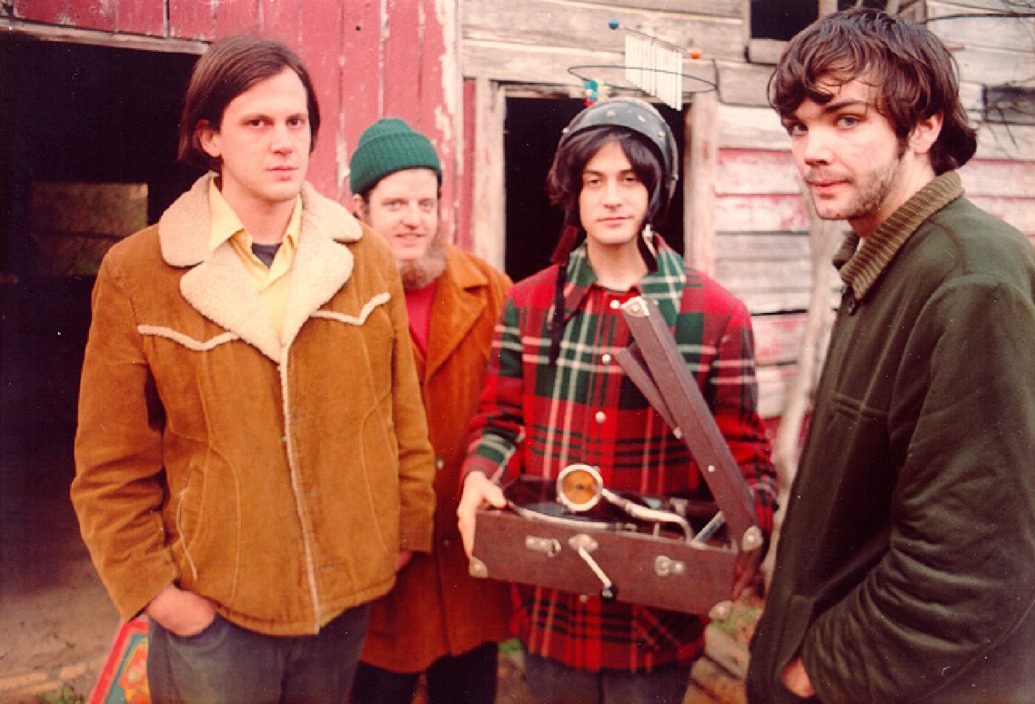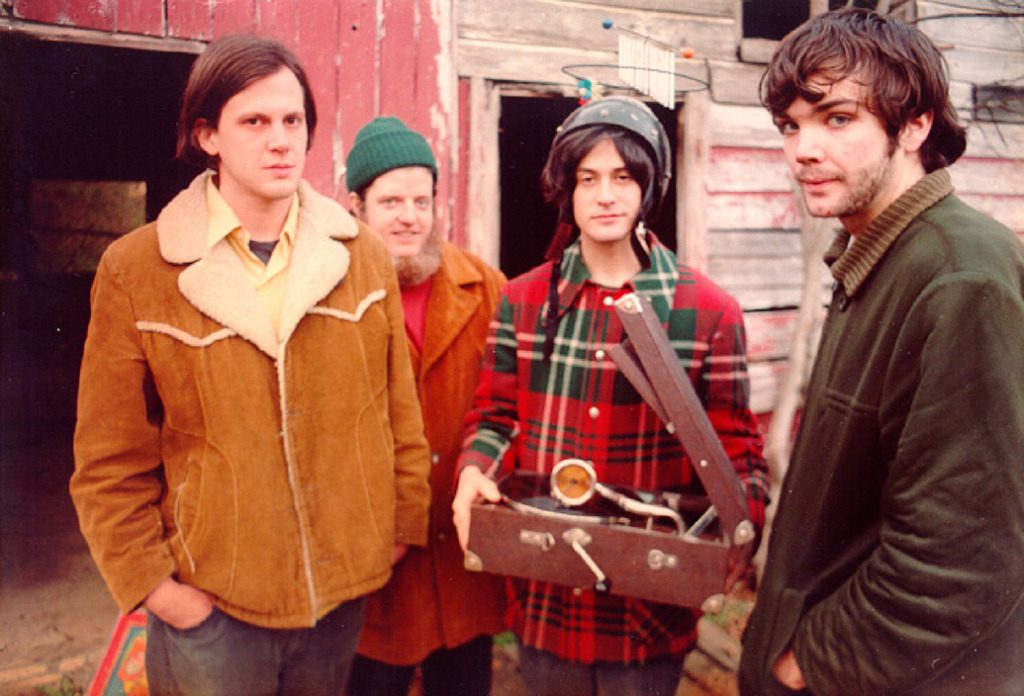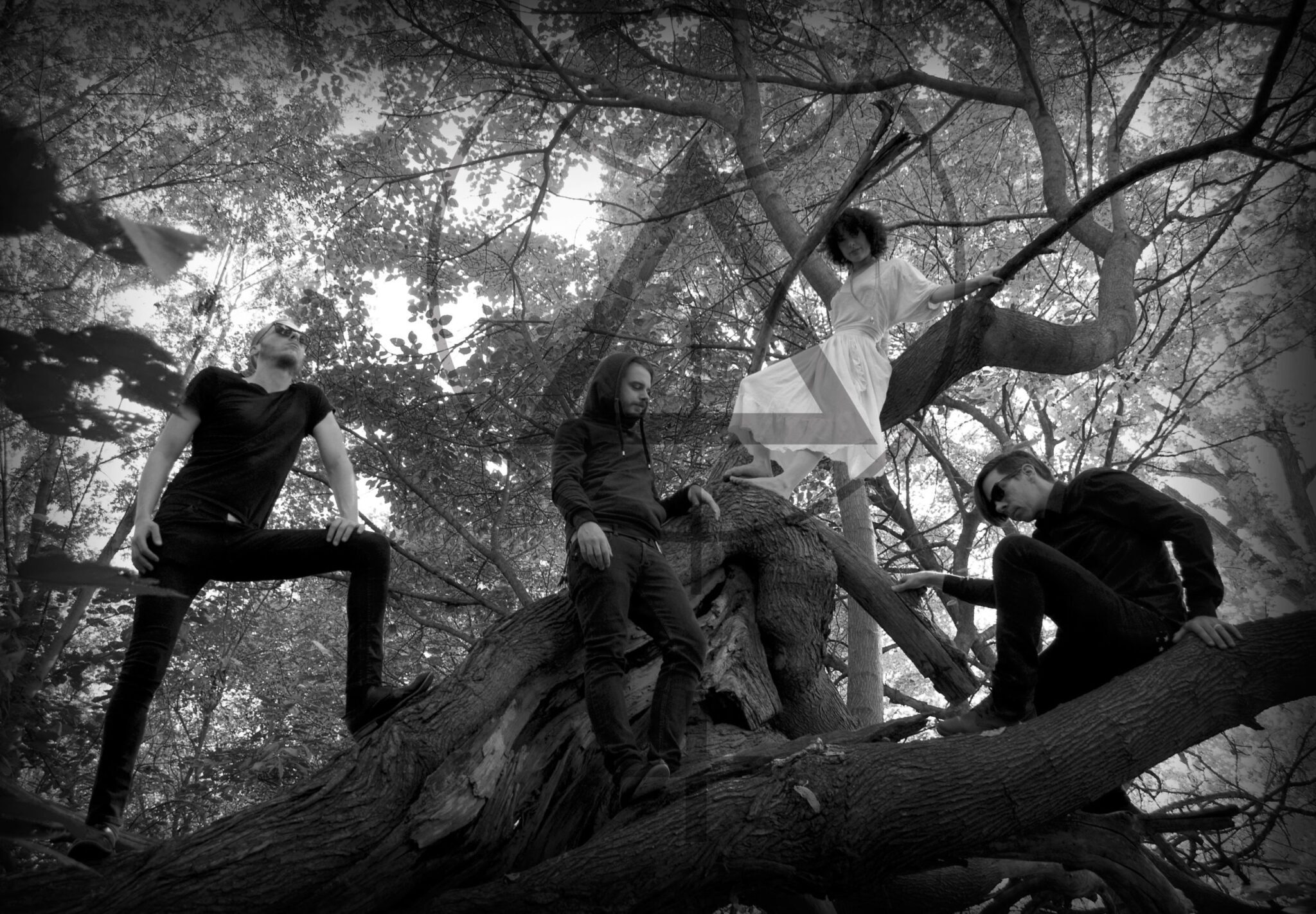
When I was seventeen, I was hopelessly infatuated with an eighteen-year old poetry major who scribbled Neutral Milk Hotel lyrics on various buildings throughout our college campus. While the school administration felt that he was deliberately destroying the aesthetic of our pretty liberal arts school, I used to glide my fingertips over the words scrawled in the stairwell of my dormitory, gushing over how beautiful they were. In fat blue sharpie, the words read: follow me through a city of frost-covered angels, / I swear I have nothing to prove / I just want to dance in your tangles / to give me some reason to move.
At the time, I was neither familiar with Neutral Milk Hotel, nor did I know that the same brooding poetry major who lived below me had marked them on the wall. I was just so enchanted with how these words came together, a cryptic message that I needed to decode. When I finally discovered they were lyrics to a song called “Gardenhead/Leave Me Alone” from NMH’s debut album On Avery Island (1996), I became obsessed with trying to figure out why the poetry kid picked this particular section of the song. When I think about this in retrospect, it’s kind of funny and, admittedly, a smidge creepy that this was how I began listening to NMH. The thing is, by the time I’d memorized every word to “Gardenhead/Leave Me Alone,” my ritual of playing the song every morning turned into something much bigger than my silly fixation on the idea that there was a secret message behind the words in the stairwell; I was developing a relationship with the song without even knowing it.
Shortly after I dove into the NMH anthology, a meager but nonetheless beautiful collection of two albums, I began feeling all of these emotions I didn’t realize I could feel—sadness, desolation, and yearning for something I couldn’t obtain because I hadn’t even realized what it was I was yearning for. I could easily write my emotional revelation off as being a young, hopeless adolescent discovering Life with a capital L. But even now, listening to NMH’s second full-length album (and unfortunately, their last), In the Aeroplane Over the Sea still recalls that sensation of desperately wanting to reconcile absolute joy and pain, living in a world that is both beautiful and, for better or worse, quite sad.
In the Aeroplane Over the Sea came out in 1998 through Merge Records. While On Avery Island sounds like it was recorded in someone’s parents’ basement and is loaded with early 90s punk/grunge musical tropes—a fuzzy lo-fi sound, idiosyncratic riffs, quick upbeat chords, and low growling in place of singing—Aeroplane is a much softer and subtler album in terms of its sound, theme, and lyrical content. There’s a timeless quality to Aeroplane, having partly to do with the eclectic combination of instruments that NMH employs—accordions, trumpets, flugelhorns, drums, acoustic guitars, and a singing saw—and the ethereal, dream-like world that comes to life in this album is what allows it to transcend the fatal categorization of being just another good 90s rock album. Our ears perk up because of how obscure it sounds, and yet, there’s also a feeling of familiarity and comfort with hearing Mangum bellow like a 1960s British Troubadour over a smashing 1990s punk-rock beat.
To be straightforward: Neutral Milk Hotel is a weird band. They don’t make any sense. Pressed up against this collision of strange sounds and tough-to-identify instruments are phrases that reference synthetic flying machines and a world where “semen stains the mountaintops.” Not to mention the high-pitched whistle that reverberates in the background of each track like the creepy opening of The Twilight Zone. And much like The Twilight Zone, you’re never quite sure where and how to situate yourself when you listen to Aeroplane. What year is it? Who is Anna? Whose ghosts are we talking to? Part of what makes Aeroplane so wonderful is because you are displaced. You’re hearing familiar words and images, but it’s as if you’re meeting these words and images for the first time, because of how Mangum places them next to one another in songs. It’s like when you repeat a word aloud a hundred times and suddenly, you don’t know what the word means anymore; it becomes an empty and awkward two-, three-, four-syllable sound. In “King of Carrot Flowers, Parts 2-3,” the first half of the song is just Mangum calling out “I love you Jesus Christ / Jesus Christ, I love you, yes I do.” Although religious illusions are a common trope in certain folk music, Mangum’s voice is so shrill and unwavering, the allusion to an actual religious figure is almost imperceptible—it’s more like a character named Jesus Christ appearing at random in the song, which then becomes about the spiritual experience of hearing Mangum’s drawl and how it quietly hovers over the gentle strumming of a banjo, as if the song were a lullaby.
Mangum wrote Aeroplane after he read The Diary of Anne Frank. By mish-mashing words, imagery, and sounds, Mangum guides us through the surreal world of Anne’s diary, equal parts historical and romanticized. In “Holland, 1945,” Mangum shouts over a loud and exuberant drum pattern, “the only girl I’ve ever loved / was born with roses in her eyes / but then they buried her alive / one evening in 1945 / with just her sister at her side / and only weeks before the guns / all came and rained on everyone.” While we weren’t there when the concentration camps were liberated (mere weeks after Anne Frank was killed), we know how it feels to lose someone due to bad timing. What’s unexpected about this song, however, is the subtle hope contained therein. “Holland, 1945” is actually upbeat and lively, unlike the darker and more haunting songs that come later in the album like “Oh, Comely” or “Two-Headed Boy, Part 2.” Right after the song’s opening lines, Mangum continues, “Now she’s a little boy in Spain / playing pianos filled with flames.” Anne’s spirit is eternal; those feelings of acceptance and absolution come through in the song.
There’s a raw honesty and vulnerability that swims through the album, especially in Mangum’s quaking vocals, and his unabashed willingness to confront and accept loss propels the music. In the album’s title-track, Mangum sweetly sings, “And one day we will die / and our ashes will fly from the aeroplane over the sea / but for now we are young / let us lay in the sun and count every beautiful thing we can see.” This earnest carpe diem philosophy permeates the album through and through. On the same track, Mangum continues, “there are lights in the clouds / Anna’s ghost all around / hear her voice as it’s rolling and ringing through me.” Sometimes when I’m listening to Aeroplane, it’s not just Anne Frank’s ghost that I’m thinking about. There are the ghosts of old lovers and friends; the ghost of the poetry major who lived below me in my first year of college; Mangum’s ghost, which can be felt in every line of the music.
Like most rock bands, the frontman is the reference point to how we, as the listener, try to humanize or characterize the band into one person. With an album as poetically rich as Aeroplane, it’s difficult to not read the album as a direct bible or mantra of Mangum’s. And for many years, it was all fans had to go by—in 1998 after touring in support of Aeroplane, the band broke up, cementing the already strange album’s cult classic status. The more mystery there is surrounding something, the greater the appeal, right? Mangum continued to do sporadic solo shows, including a special appearance at Occupy Wall Street. But then last year, the band surprised everyone by announcing they’d be reuniting for a 2013-2014 tour. At first it was just a few dates, but this quickly expanded into a slew of festival appearances and several dates in the NYC area, including the “Celebrate Brooklyn!” summer concert series in Prospect Park. I was apprehensive about buying a ticket; this tour would be the first time in 15 years since Mangum, Jeremy Barnes, Julian Koster, and Scott Spillane all shared a stage together. Would the live renditions of these songs, which I’d only heard through computer speakers and record players, still be as poignant this late in the game? I bought tickets anyway.
Unfortunately, it rained on the date I went, so there was an unexpected 20-minute intermission. While the program’s organizers urged fans to evacuate or stay at their own discretions, it shouldn’t be surprising that most fans firmly stood their ground. And I’m glad I did too. I’ve never witnessed anything more beautiful than a grisly 43-yr old Mangum crooning “Oh Comely,” as lightning flared underneath the stratus, and the crowd, mostly dudes in their early 30s/40s (probably nostalgic of their angsty adolescence) crooned along. Maybe I cried, but that’s okay. A lot of people cry over the ghosts they know.





